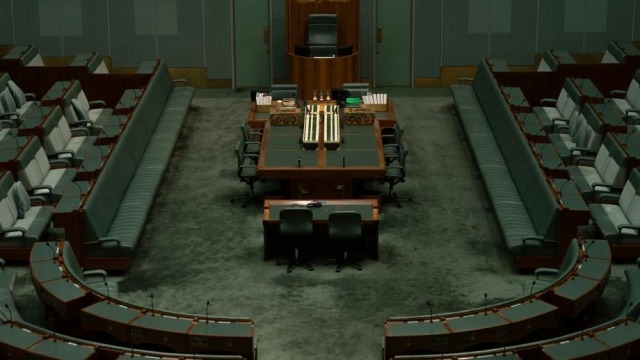Opinion: There is one crucial Howardism that Peter Dutton has ignored

By Mark Kenny
A version of this article was originally published by The Canberra Times.
Nobody could doubt Monique Ryan's keen intelligence but when the paediatric neurologist almost stalled on national television, the expression "not match-fit" sprang to mind.
Insiders host David Speers sought the teal MP's response to news that social media influencers had been secretly paid to spruik a fellow independent. A simple question should have elicited a simple answer - yes, voters must be told when an influencer was being paid.
A politician promising a higher standard of representation could hardly say otherwise.
Instead, after a couple of unsuccessful deflections and an excruciating pause, she repeated, "I'd have to give it some thought, David". Tres awkward.
Dr Ryan had pulled off a major upset in 2022 by wresting blue-ribbon Kooyong from the then-treasurer and presumptive next leader, Josh Frydenberg.
More than any individual outcome on election night, that would shape the course of national affairs.
By ending Frydenberg's parliamentary career, it gave the ultra-conservative Peter Dutton an unhindered run at the Liberal leadership - a man who just four years prior had been considered scary and unsellable by his own peers.
Thus, her victory in '22 was the sliding doors moment which altered conservative politics and inevitably, the country.
But there is something beyond the desired removal of Frydenberg that Ryan and Dutton share in 2025.
Both, it turns out, have been humbled by the quicker pace and inquisitive glare of the campaign-proper.
That doesn't make them equal. As a community independent, Ryan would not normally be expected to handle an interrogator of the quality of Speers. Hers is a different skillset tailored for local and retail representation. Dutton, on the other hand, insists he alone should be prime minister.
Yet since taking over the Liberal leadership, he has kept his press conferences in Canberra to a minimum, favouring instead regional door-stops where journalists are less senior and less specialised.
He has also kept up regular interviews with friendly talk-back hosts where the tenor can be described politely as "facilitative".
Ryan's moment of vulnerability will not damage her chances of re-election. Her larger problems are (i) the unpopularity of the state Labor government in Victoria which could drive ex-Liberal converts back to their old party, and (ii) boundary changes which mean she must attract voters with whom she had no relationship in '22.
Such phenomena are largely beyond her control.
Dutton's vulnerability, however, has been three full years in the making. His descent in current polling is the dividend of a calculated risk to run through to an election with maximum focus on the government, minimum focus on policy, and the lamest front bench for a major party in generations.
Dutton's problem, then, is structural and cannot be fixed quickly. Which is why the Liberal leader has been flat-out wallpapering over his cracks and over-egging his attacks, such as the absurd verballing of Indonesia's president.
This was a major error of judgement and exceedingly reckless.
His wallpapering has seen an emphasis on conservative "values" to mask an absence of deeper policy discussion in the party room. It has produced such populist gems as the plan to end work-from-home flexibility, the promise to slash 41,000 public servants, and even loose Trumpian talk of doing away with the Department of Education.
Most pointedly, it has brought the extraordinary humiliation of a major party leader first announcing, then abandoning policy, replete with an abject apology.
What that apology was for, though, was less clear. Was it for the wrong-headed objective to force government employees back to the office five days a week? Or was it simply tin-eared? Was the plan wrong in principle, or was its unveiling before an election the real mistake?
And what does this indicate about other spending cuts openly signalled but not specified?
There was also a statement after his budget reply that he would not offer tax cuts to voters in the campaign because his priority would be budget repair. Two weeks later, tax breaks featured heavily in his campaign launch.
Last week, Dutton told News Corp that the indexation of income tax rate scales is a "personal aspiration". Days before voting starts, what does "personal" mean?
This improvised chaos introduces a new variation on the small target: the moving target.
These policy and rhetorical vagaries appear to have emerged from Team Dutton's earlier (and since deflated) belief that a brash Trumpian appetite for bold disruption and cultural combat was sweeping the democratic world.
John Howard, whom Dutton names as his "model", was fond of saying "you can't fatten a pig on market day". In other words, being ready to govern involves years of hard policy grind followed by sustained advocacy outlining what you stand for and how you would deliver it.
It is curious that Dutton has ignored this key tenet of Howardism.
The tough-talking Queenslander had made surprising headway by skewering the Albanese government and lifting the Coalition to the appearance of a unified, competitive, alternative for government in just one electoral cycle.
But in terms of political nutrition, the stark reality of the election campaign has exposed these manoeuvrings as "hollow carbs" when voters yearn for protein and substance.
Mark Kenny is the Director of the ANU Australian Studies Institute and host of the Democracy Sausage podcast.








